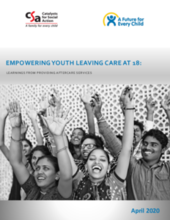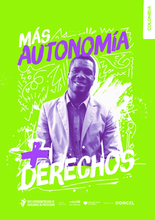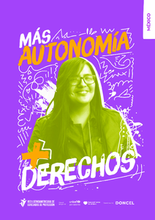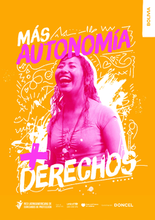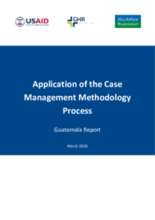Displaying 311 - 320 of 991
This paper describes an approach to supporting young people leaving Child Care Institutions (CCIs) in India that is potentially scalable to children in all CCIs.
The current exploratory study is the first to look at the challenges and barriers in this transitional life stage of 23 Israeli Arab young adults, from their own perspectives, after leaving residential care.
This article explores the perspectives of Cambodian boys who have experienced human trafficking and sexual exploitation on their experiences transitioning out of shelters and re‐entering the community.
This presentation explores the structures and programs one university system is creating for college students emerging from foster care (SEFC).
Este video describe brevemente la investigación de la Red Latinoamericana de Egresados de Protección coordinado por DONCELque estudió cómo se dan los egresos de las y los adolescentes que crecieron bajo el sistema de protección del Estado, lejos de sus familias por haber sufrido abusos, maltratos y violencia.
En este informe se presentan los resultados de la investigación llevada adelante en Colombia que tuvo por objetivo construir información sobre las principales políticas, medidas y acciones que se desarrollan a nivel regional orientadas a acompañar el egreso de adolescentes y jóvenes del sistema de cuidados alternativos e indagar respecto de su eficacia, efectividad, sostenibilidad y adecuación a un enfoque de derechos.
En este informe se presentan los resultados de la investigación llevada adelante en México que tuvo por objetivo construir información sobre las principales políticas, medidas y acciones que se desarrollan a nivel regional orientadas a acompañar el egreso de adolescentes y jóvenes del sistema de cuidados alternativos e indagar respecto de su eficacia, efectividad, sostenibilidad y adecuación a un enfoque de derechos.
The aims of this article were to identify the types and characteristics of social support for families in vulnerable situations and to analyze what elements influence families’ attitudes towards these supports.
En este informe se presentan los resultados de la investigación llevada adelante en Bolivia que tuvo por objetivo construir información sobre las principales políticas, medidas y acciones que se desarrollan a nivel regional orientadas a acompañar el egreso de adolescentes y jóvenes del sistema de cuidados alternativos e indagar respecto de su eficacia, efectividad, sostenibilidad y adecuación a un enfoque de derechos.
This document presents a summary of the process, results and lessons learned during a demonstration project in the department of Zacapa, Guatemala to implement best practices to prevent unnecessary family separation and strengthen families by identifying primary and specialized social services and bringing those services closer to the families.

